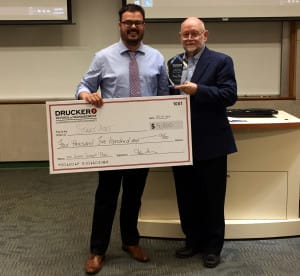Start Art Legal Takes First Place at 26th Annual Kravis Concept Plan Competition
An Art Business student from Claremont Graduate University, Jacob Janzen, took the first place prize at the annual Kravis Concept Plan Competition on April 15, 2016. His concept: Start Art Legal, a web-based platform that connects young artists with timely translations of their legal contracts into plain English.
This year’s 26th annual Kravis Concept Plan Competition continued the tradition of past years, awarding the best entrepreneurial ideas from Claremont Colleges students and alumni. The event, organized by CGU’s Peter F. Drucker and Masatoshi Ito Graduate School of Management, is funded through an endowment by Henry R. Kravis and is judged by the business school’s professors and affiliates.

Taking the top prize of $4,500, Janzen’s idea comes from his firsthand knowledge that BFA and MFA students receive little training in the legal process of selling and managing their own artwork. According to Janzen, navigating legal jargon is a problem for many young artists who cannot afford the cost or the time required for official legal counseling.
Start Art Legal allows artists to upload contracts online and receive plain English translations of the terms within 24 hours. Janzen envisions that these contract translations will give artists the clarity they need to make quick and intelligent decisions when it comes to selling or displaying their art.
The Art Business program in which Janzen studies is part of the Center for Management in the Creative Industries, a collaboration between CGU and Sotheby’s Institute of Art. The program prepares graduates for careers in the many asset-driven sectors of the visual art world.
The second place prize of $2,500 went to Jill Mintzer, a Drucker School MBA student, who proposed the smart device and app concept iHYDR8.
Mintzer’s idea comes from her knowledge that most Americans are dehydrated but that their efforts to drink more water often lead to excessive use of disposable plastic bottles. The smart device iHYDR8 connects to a reusable water bottle, tracking the amount of water the user drinks, and then transferring that information to a mobile app, allowing users to manage and achieve their hydration goals in an ecofriendly manner.
Coming in third place with an award of $1,500 were the founding members of the web-platform WeHealth: Uloma Alozie, Autumn Emerson, Heather Petty, and Andrew Wood from the Keck Graduate Institute.
WeHealth is a social network connecting those affected by and those researching cures for rare diseases. The platform offers community to those affected by rare diseases while also providing biotechnology communities efficient access to potential trial participants.
Judges awarded two fourth place prizes of $250 to the other two finalists: CollegeMed and Bonding.
CollegeMed, a concept from Pitzer College students Dalton Varney and Marcus Curl, would offer state-certified EMTs for hire at all social events of the Claremont Colleges. The pair said their service would improve the current requirement of having Campus Safety officers at campus parties.
Bonding—created by CGU students Kensaku Honda, Soichiro Inagaki, and Wei Ti Wen—is a social network aimed at connecting small business owners and skilled millennial consultant workers. The platform would allow business owners to gain inexpensive consulting from young consultants who are looking to enhance their résumés.